Ahmedabad: Family business destination to startup hub
Family-run businesses are putting Ahmedabad on the map. Despite being late in the race, with the help of government initiatives, ventures are fast turning the city into an emerging startup hub


When you think about Gujarat, usually family-owned businesses come to mind. But this perception is gradually changing as the largest city in the state is seeing a brewing startup culture. On August 29, a report from Deloitte-Nasscom put a spotlight on Ahmedabad, calling it one of the emerging technology hubs. The city also ranked highly in terms of ease of doing business. The land of entrepreneurs, as the report pointed out, has a high density of startups due to better infrastructure, government support and a talent ecosystem. About 40 percent of the startups have burgeoned in sectors including BFSI, pharmaceuticals, agritech and the internet.
LendingKart is one such fintech startup that started operations from Ahmedabad in 2014. Harshvardhan Lunia always wanted to start his own business. After quitting his job in London, he came back to Ahmedabad and started a debt advisory platform, which didn’t scale the way he had hoped. Lunia gave entrepreneurship another shot, this time looking at lending in the MSME space, with LendingKart. “Mumbai is the financial capital of the country and Bengaluru is the tech hub. I did consider setting up operations in either of these two metros, but my family was based in Ahmedabad, so it was more of a cost-saving strategy," he laughs. In hindsight, it was a great decision with the kind of infrastructural growth and government incentives the city has seen over time.
Finding the right talent was a potential issue for most startups, but not anymore. “Finding tech talent was a bit challenging, so we set up an office in Bengaluru in 2015 for our tech-related work," explains Lunia. For most other roles, LendingKart’s founder and CEO reckons, “quite a few people were willing to relocate to Ahmedabad, given that it offers a better quality of life and lower cost of living." From revenues of ₹2-3 crore in 2014-15, the company has clocked a turnover of ₹1,200 crore in FY23, claims Lunia.
First-generation entrepreneurs face a unique set of challenges. Building everything from the ground up, they often lack access to financial resources and guidance that their peers from business families might enjoy. For instance, Sandeep Patel had dabbled in many other businesses before he found success with his waste management company Nepra, also known as Let’s Recycle. The 15-year-old company is a market and leveraging tech solutions firm, has managed to build an end-to-end supply chain, from collecting waste to recycling it. It also uses artificial intelligence-based sorting solutions for waste segregation.
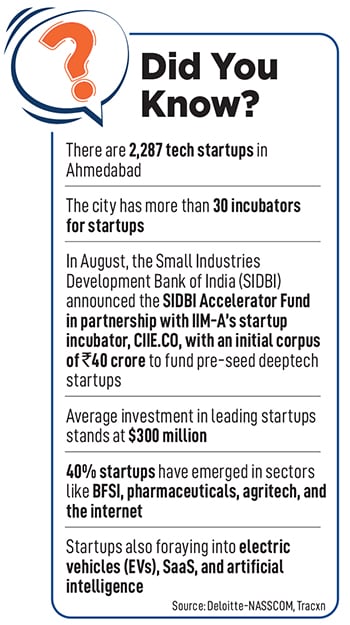 The startup processes about 800 metric tonnes of waste on a daily basis and has also expanded its footprint to Maharashtra, Madhya Pradesh and other regions in Gujarat. In the initial years, recalls Patel, “People didn’t understand our business. They used to keep us waiting outside their office for hours. Some of them even asked us to go away because they didn’t respect what we did." Today, Let’s Recycle serves clients, including Tata, Reliance, Amul and Adani. Patel is now looking to expand further into B2C. The company has raised $38.6 million from investors like Aavishkaar Capital and Circulate Capital. “From a startup, we are more at a growth stage now, where the mindset has become risk mitigation. So while we have defined our processes and business model, we continue to innovate on our business," says Patel.
The startup processes about 800 metric tonnes of waste on a daily basis and has also expanded its footprint to Maharashtra, Madhya Pradesh and other regions in Gujarat. In the initial years, recalls Patel, “People didn’t understand our business. They used to keep us waiting outside their office for hours. Some of them even asked us to go away because they didn’t respect what we did." Today, Let’s Recycle serves clients, including Tata, Reliance, Amul and Adani. Patel is now looking to expand further into B2C. The company has raised $38.6 million from investors like Aavishkaar Capital and Circulate Capital. “From a startup, we are more at a growth stage now, where the mindset has become risk mitigation. So while we have defined our processes and business model, we continue to innovate on our business," says Patel.
It’s not just first-generation entrepreneurs, even the next generation of existing family businesses have been looking to try something new.
Sulay Lavsi is one such example. The Lavsis have been wholesale and retail agents for Raymond for over 60 years. As with most family-run businesses, Lavsi had a choice—join the business or start something of his own. While he had the option to do both, he chose the latter. “Several Gujarati family businesses are run very traditionally and given their years of being in business, there are set ways. Alternatively, the startup world really excited me given the speed at which things move there," explains Lavsi. Therefore, in 2020, he set up Bummer, an underwear and loungewear brand targeting millennials. “I always had the security of my family business. In case my startup failed, it would be a learning opportunity for me… I guess I was lucky in a sense," he adds.
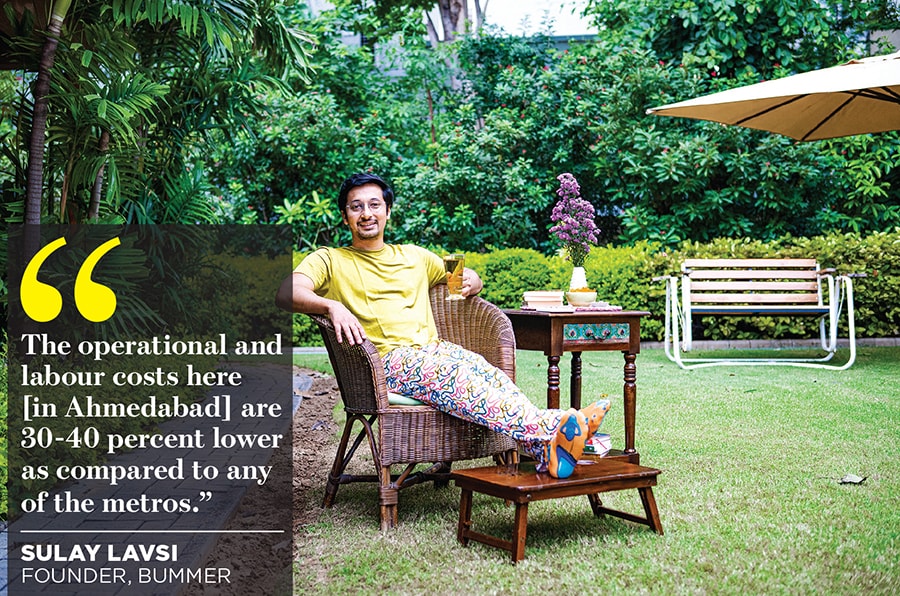 Image: Mexy Xavier
Image: Mexy Xavier
During his time, pursuing his masters in the US, Lavsi found the underwear market to be very exciting with a variety of large players. But when it came to the Indian market, he realised the largest player here was only Jockey. “Personally, I find markets that are monopolistic in nature very fascinating because they have a large room for disruption," he adds.
But when it came to setting up operations, he didn’t think twice before deciding on Ahmedabad. “The operational and labour costs here are 30-40 percent lower as compared to any of the metros," he explains. The startup has raised $180,000 from Singapore-based Beenext and ₹75 lakh from Shark Tank India’s Aman Gupta, co-founder and CMO, Boat Lifestyle and Namita Thapar, Executive Director - India Business, Emcure Pharmaceuticals. With an established online presence, Lasvi’s plan is to hit offline stores in Ahmedabad over the next three months.
There are also next-gen entrepreneurs who worked in their family business for almost a decade before deciding to strike out on their own. Ravi Varmora is one of them. He worked in his family business of manufacturing ceramic tiles, sanitaryware, bath fittings and houseware products for eight years before launching his agritech startup. He did this for personal growth and to step out of his comfort zone. His family, initially hesitant about his decision, eventually decided to support him.

“Everybody tried to convince me not to take this route. They were trying to protect me by showing me the possible dangers of the startup world. But I was firm about my decision," says Ravi, who launched Univia in September 2020. The agritech startup, which has raised ₹7.4 crore from friends and family, provides agronomy solutions to over 50,000 farmers in Gujarat and is planning to expand to Rajasthan. “We offer a real-time user-friendly app and personalised solutions, right from soil inspection to produce sales," he adds.

Speaking of innovation, in 2020, FMCG major Marico acquired Ahmedabad-based men’s grooming startup Beardo within five years of the latter’s inception. The startup had a successful men’s grooming brand. According to Fintrackr, the total value of the acquisition was in the range of ₹350 to ₹400 crore. The co-founders, Ashutosh Valani and Priyank Shah, already had the next plan in place. The duo joined their friend, actor Aashka Goradia Goble and launched Renee Cosmetics the same year. The direct-to-consumer (D2C) brand offers beauty products such as eye makeup, lip colours, skin serums and highlighters.
It has raised $36 million over four rounds. Their cruelty-free products are available on ecommerce platforms such as Nykaa, Amazon, Flipkart and Myntra, along with over 650 shop-in-shop stores across India. They also have a presence in malls, stores and airports. The Mensa brand-backed company claims to be growing 300 percent year over year. “Renee has been one of the fastest-growing FMCG brands in beauty in the country. Within three years, we are already at ₹250 crore ARR [annual recurring revenue], which very few brands have been able to do," says Valani.
In FY22, the gross revenue from operations was ₹32.2 crore, up 5.1 times from ₹6.37 crore in FY21. Renee posted a ₹7.26 crore loss in FY22 against a ₹53 lakh profit in FY21, according to Entrackr. The latest fundraise happened in 2022 with the purpose of brand building, delivering growth and offline expansion, explains Valani. “That’s a short-term loss against long-term value creation. While there may be losses in the initial phase, the plan is to quickly turn profitable at scale."
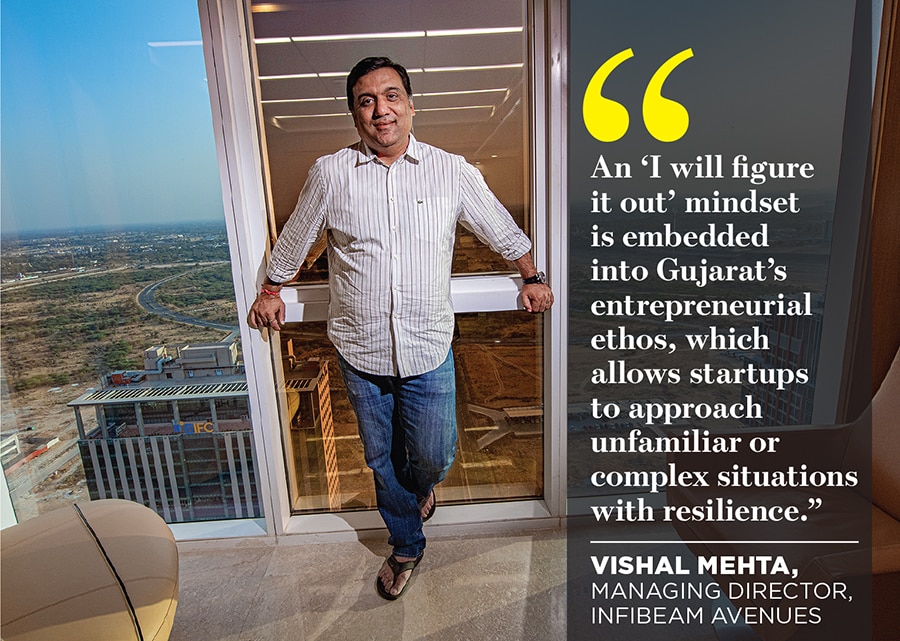
In 2000, as the dotcom bubble burst, many internet startups went out of business in the US. At the same time, in Ahmedabad, 32-year-old Niraj Hutheesing started developing a software for the family’s chemical business, to help with a new excise-related invoicing method. “Along with some of my friends who were in the IT space, we developed a software called Financial Accounting Comprehensive and Easy (FACE). The drive to set up a company bringing finance and tech together is what led to starting Cygnet Infotech," says Hutheesing.
“Earlier, we were getting peripheral work, and the core work on the product or solution was happening in the US or Europe. Now, India is the core hub where all the innovation happens," he adds. Apart from issues with finding the right tech infrastructure and funding, getting the right clients was a challenge for his team as well.
As the company has grown over the years—with offices across seven countries and touching close to ₹230 crore in turnover in FY23, Cygnet has been hiring more senior executives for leadership roles lately. Instead of asking new hires to move to Ahmedabad, Hutheesing says, “We have created guest houses in Ahmedabad for our senior executives. They come here for two weeks in a month, and work from home the remaining two weeks. This method has helped us hire some top-notch talent," explains Hutheesing.
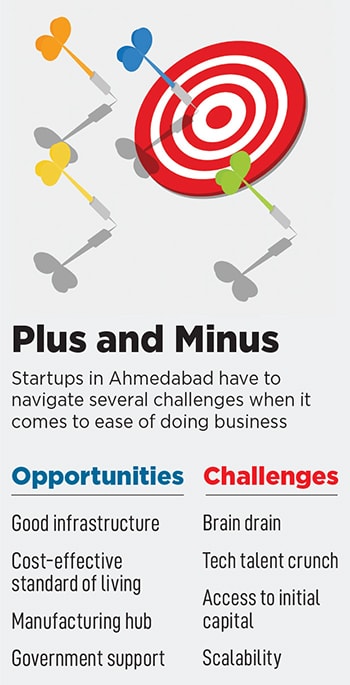 Another early startup from Ahmedabad is Infibeam Avenues. Founded in 2007, the company started as an ecommerce platform and later grew into a fintech company. It is also looking to enter the AI space now, and recently announced that it will be establishing “India’s first AI hub headquartered at Gujarat International Finance Tec-City (GIFT City) with an initial focus on fintech and financial sector, building AI solutions for fraud detection, authentication and risk identification (FAR) to nurture AI ecosystem and develop solutions for the domestic and global market", says Vishal Mehta, managing director, Infibeam Avenues.
Another early startup from Ahmedabad is Infibeam Avenues. Founded in 2007, the company started as an ecommerce platform and later grew into a fintech company. It is also looking to enter the AI space now, and recently announced that it will be establishing “India’s first AI hub headquartered at Gujarat International Finance Tec-City (GIFT City) with an initial focus on fintech and financial sector, building AI solutions for fraud detection, authentication and risk identification (FAR) to nurture AI ecosystem and develop solutions for the domestic and global market", says Vishal Mehta, managing director, Infibeam Avenues.
Despite early challenges, what differentiates a Gujarati entrepreneur is their ‘aapade fodi laishu’ or ‘I will figure it out’ mindset. “This mindset is embedded into Gujarat’s entrepreneurial ethos, which allows Gujarat-based startups to approach unfamiliar or complex situations with resilience and manage resources and get work done to its optimum capacity," says Mehta. “This ‘I will figure it out’ mindset when mixed with risk-taking ability is a potent potion for a sustainable and profitable business for the Gujaratis."
From an infrastructure standpoint, things have changed drastically over the last decade with the development of GIFT City in Gandhinagar. As one of the many companies working out of the GIFT City, Mehta says, “This aided companies like us with a competitive advantage by offering a conducive business environment, tax benefits, advanced infrastructure, global connectivity, regulatory ease, cost advantage and access to a specialised financial services ecosystem."
Gujarat has seen many initiatives in the recent past to improve the ease of doing business. Initiatives like Gujarat Industrial Development Corporation (GIDC) and Gujarat International Finance Tec-City (GIFT City) provide a business-friendly environment, attracting more investors. Additionally, the GIFT International Financial Services Centre (GIFT IFSC), a financial centre and special economic zone in GIFT City is also attracting MNCs and companies like Cygnet Infotech to set up offices. “This kind of initiative will help fuel a lot of growth in the fintech and BFSI segment," adds Hutheesing.
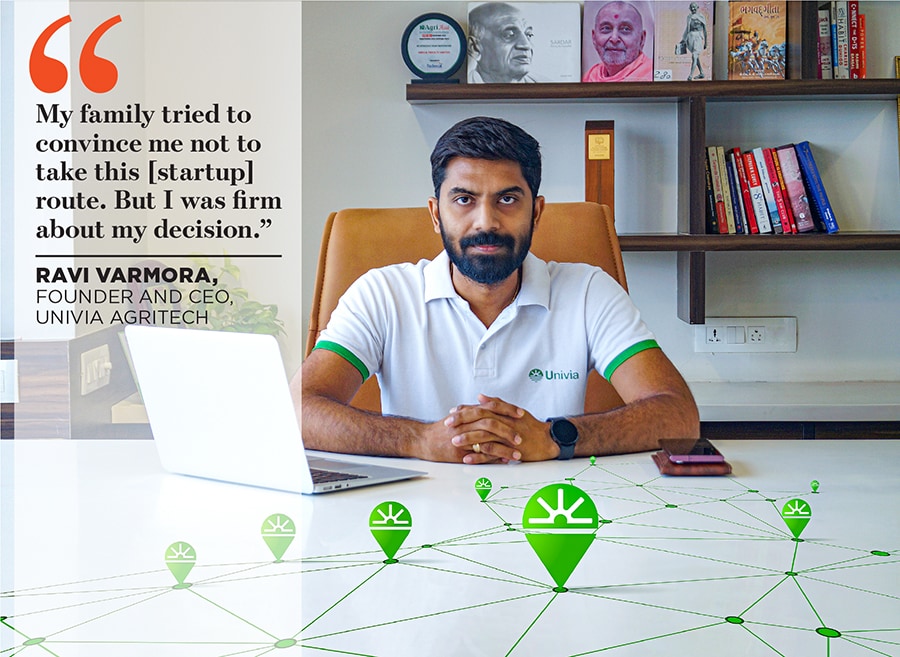
While it has seen growth over the last couple of years, the startup ecosystem in Ahmedabad is still nascent. The lack of visibility for startups beyond a few successful names is due to an unripe market. Additionally, at an early stage, the non-availability of good talent and access to initial capital make it relatively challenging for startups and hinder their growth in the region, explains Anil Joshi, managing partner at Unicorn India Ventures. Ahmedabad also faces the problem of brain drain as many talented people move out of the country for higher studies or job prospects, making it difficult for startups to have access to good talent.
 Image: Mexy Xavier
Image: Mexy Xavier
“We are also seeing reverse brain drain along with people taking entrepreneurial journeys from the state and then moving out of Ahmedabad. I expect it to improve in the coming years considering the spread of startup culture across the country and in the state in particular due to the growing activities," says Joshi, who has invested in Ahmedabad-based Gamerji, which helps conduct esports tournaments in India and overseas.
Ahmedabad is also seeing startups in the electric vehicles (EV), software as a service (SaaS) and AI space. “The city offers a burgeoning market, a reservoir of skilled talent, and a cost-effective standard of living. However, it is essential to acknowledge the presence of challenges, including intense competition, regulatory intricacies and the imperative to carve a distinct value proposition within a dynamic marketplace," says Mehul Shah, partner at Rasesh Shah & Co. He has invested in startups like Bummer, UrbanNaps, Farmse, Big Spoon, and more.
Incubators like IIM-Ahmedabad’s Centre for Innovation Incubation and Entrepreneurship (CIIE.co) is nurturing budding entrepreneurs in the city. So far, they have invested in 25 startups at the seed stage and provided non-dilutive capital to over 50 startups at the pre-seed stage. Over the years, Ahmedabad has been home to tech-enabled and D2C startups too. Institutions like ISRO, IIT-Gandhinagar, DA-IICT are fuelling innovation in deep tech. “Due to the strong footing of these institutions, today we are also seeing founders from Ahmedabad setting up deep tech ventures in domains such as space tech, biotech and fintech," says Vipul Patel, partner, seed investing at IIM-A’s CIIE.CO.
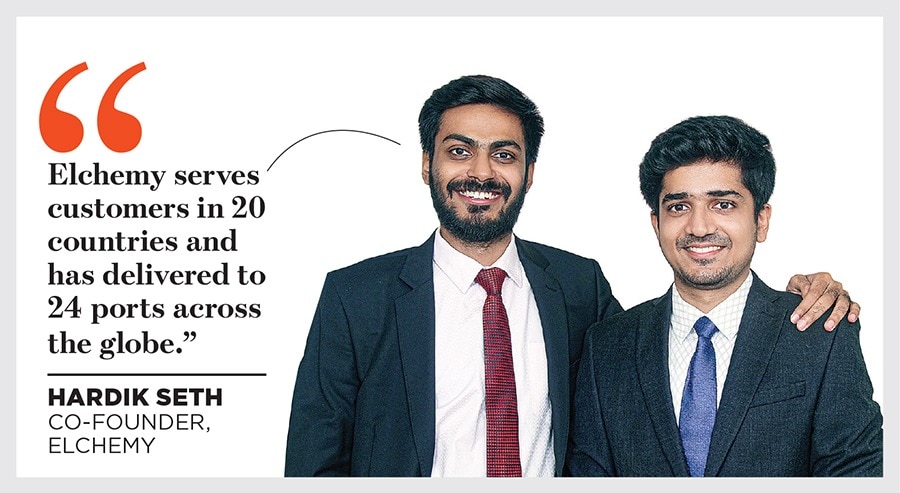
Many founders who launch their startups in Ahmedabad eventually shift bases due to a lack of availability of specific tech talent in the team-building process. “We believe the city will overcome this challenge in years to come as the ecosystem as a whole matures," he adds.
One such example is Elchemy, which started its operations at IIM-A CIIE in April 2021 and moved to Mumbai in May 2022. The startup still has operations in Ahmedabad. Founded by Hardik Seth and Shobhit Jain, Elchemy is a tech-enabled exporter of chemicals, with most of the processes (in an order fulfillment cycle) automated.
“Elchemy has digitised the supply chain and made cross-border trade in chemicals extremely seamless. The paperwork is automated, and a system-enforced checklist makes exports hassle-free," explains Seth, who studied chemical engineering at IIT-Bombay and later pursued an MBA at IIM-Ahmedabad. The startup raised $2 million in March 2022 from Sanjeev Bikhchandani’s InfoEdge Ventures, Vinati Saraf of Vinati Organics, and Murugappa Group, among others.
Ahmedabad is a unique city with an entrepreneurial DNA, where people don’t believe in losing money. The cost of starting and running the business is low, access to high-end talent is equally challenging, and while it is improving, it will take some time to mature, concludes Joshi of Unicorn India Ventures.
First Published: Sep 08, 2023, 15:03
Subscribe Now